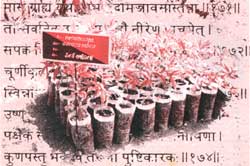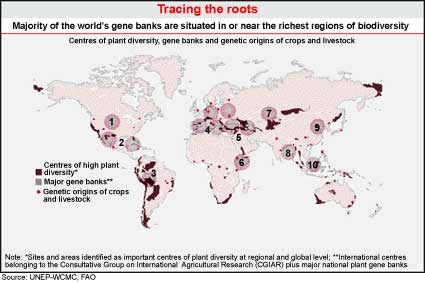
Going back to the past for a better future
The Tarun Bharat Sangh is helping drought hit villagers of Alwar district of Rajasthan grow crops by reviving a traditional system of dam construction.

The Tarun Bharat Sangh is helping drought hit villagers of Alwar district of Rajasthan grow crops by reviving a traditional system of dam construction.

Scientists have evolved a subsurface drainage system that makes saline soils arable within three years
Farmers in India are using 25 times the amount of water that agricultural scientists say is needed to produce paddy. Improper irrigation methods and misconceptions are the stated reasons for the high wastage of a scarce resource.

The search for easily applicable environment-friendly plant protection technologies could very well find its answer in the pages of history

Looked at on a geological timescale, the planet's biodiversity has always been faced with threats of one form or another. But, at present, the threat is more pronounced than ever: species loss is

Agriculturists in India are gradually moving away from chemical pesticides and fertilisers;

Biotechnology, which holds the answers to many persistent problems such as controlling disease and increasing food production, has tremendous potential in cash strapped India. But to succeed, it needs a helping hand from industry.

Overexploitation, increasing salinity and industrial pollution are threatening groundwater resources in several parts of the country
The NSC has transformed itself from the usual non-profit-earning PSU into a vibrant entity. Private sector seed companies have, till now, had a virtual monopoly over the production and sale of seeds, mostly hybrid seeds, of high-value crops. This was chiefly because the public sector seed producers, besides being fewer in number, remained focused right from the beginning on the production of seeds of low-value but high-volume crops (basically cereals), where profits were low though the quantities to be handled were large. Besides, public sector units (PSUs) made little attempt to keep pace with time. However, the much-needed change in the public seed sector is coming about now with the largest player, the National Seeds Corporation (NSC), adopting a corporate culture and deploying state-of-the-art technology to produce seeds even of high-value crops and hybrids. Indeed, as could be expected, this change in the work culture has transformed the NSC from the usual non-profit-earning PSU into a vibrant entity striving to find a place among the mini-Ratnas, if not the Navratnas. The headquarters of the NSC and four of its regional units in Bhopal, Jaipur, Secunderabad and Bangalore, have already acquired the ISO 9001-2000 certificate and the remaining regional units are in the process of doing so. No wonder then that, after a gap of 32 years, the NSC paid a 5 per cent dividend, amounting to a little over Rs 1 crore, to the government in November last. This was made possible by a massive 46 per cent growth in business in the past one year alone. Its post-tax profits jumped by a whopping 200 per cent in 2006-07. Indeed, the man behind this incredible transformation is the present chairman and managing director B B Pattanaik. "I would be able to declare a much higher dividend for the current year,' asserts an enthusiastic Pattanaik. He has not only motivated the aging employees of this 45-year-old corporation for better performance but has also taken several new initiatives to be in a position to rub shoulders with the well-run private sector seed companies, many of which now have business tie-ups with the NSC. "I am not interested in increasing competition with the corporate houses; I am more for partnerships,' says Pattanaik. About a dozen big houses, including some multinational companies like Monsanto and Cargill and domestic players like ITC, ECL Agro-Tech and Sheel Biotech, have forged strategic business alliances with the NSC. Most of these companies use the vast marketing network of the NSC for the sale of their seeds and other farm inputs. The Indian Oil Corporation, on the other hand, sells the NSC seeds through its network of Kisan Seva Kendras (farmers' service centres). Significantly, the NSC is now very much into the production of hybrid seeds, organic seeds and even tissue culture plantlets. It is multiplying the seeds of mustard hybrid DMH-1-DHARA evolved through biotechnological interventions by the Delhi University; as also those of the pigeon pea (arhar) hybrid, ICPH 2671, evolved by the Hyderabad-based International Crops Research Institute for Semi-arid Tropics (ICRISAT). Besides, the NSC would soon begin supplying gladiolus bulbs for flower cultivation. The NSC's tissue culture unit with a capacity to churn out annually about two lakh test tube-raised plantlets for propagation of the banana is coming up in Bhubaneswar and may become operational by the next month. For research and development back-up, the NSC gets support from the vast agricultural research network of the Indian Council of Agricultural Research (ICAR) and the state agriculture universities. This helps the NSC to add, on an average, around 20 new varieties and hybrids to its product range every year. Significantly, the NSC is now playing a catalytic role in the expansion of seed production, processing and storage infrastructure in the private sector under a government scheme involving 25 per cent subsidy for this purpose. About 120 projects for the creation of seed processing capacity worth 23 lakh quintals and seed storage capacity of 9 lakh quintals have already been approved. A total subsidy of Rs 6.94 crore would be paid to the private sector companies which are creating these facilities. For involving more and more farmers in the relatively more lucrative seed production business, the NSC is facilitating the provision of loans to them from the State Bank of India. Besides, it is ploughing back about 2 per cent of its own profits into the activities related to seed production by farmers and other measures as part of its corporate social responsibility initiative.
Environmental management does not mean changing your light bulbs to use less energy. It means looking at everything you use to see what is beingdestroyed. Have you ever looked at the ingredients in your make up or lotions? Does your moisturizer or lipstick carry the word squalene in the ingredient list? If your answer is yes, then you are partly responsible for destroying the oceans. Squalene is oil derived from the liver of deep-sea sharks. 270,000 sharks are killed every day just for their fins and oil. The oil from their livers goes to the cosmetic industry and the fins go for soup. This enormous and mindless genocide has made 307 species of sharks endangered. In fact, the total number of sharks left in the ocean is ten percent of what they were in 1950. Deep-sea sharks (those living in ocean depths of 300 to 1500 metres) have especially large reserves of squalene since their livers comprise one-third of the weight of the entire animal. So, most deep-sea sharks are caught only for their oil. The excessive catching of these sharks has caused the dramatic population declines of certain species. Some repeatedly targeted shark species are the Aizame shark (dog fish) Leafscale Gulper Shark, and the Gulper, Kitefin and Portuguese dogfish which live between 1300 to 1500 m below sea level. Deep sea sharks grow very slowly, mature late in life and have only a few young in their entire lives. They take long breaks between reproductive cycles, rendering them extremely vulnerable to over-fishing. These sharks are a target species in many industrial fisheries and are frequently caught by fishermen targeting other species. As a result deep sea sharks are at extreme risk and their numbers will take long to recover. The ocean is a very fragile ecosystem. Sharks are apex predators and oceanic food chains are dependent on them. The ocean will implode without predators and our dependence on ocean creatures will impact us tremendously as well. It is immoral to let entire species disappear for the dubious benefits of personal skin specially when there is a renewable alternative in olives. The cosmetic industry has a duty to educate consumers about what they are putting on their faces. Squalene is an oil used in cosmetic products ranging from anti aging creams to lip-gloss to give them a smooth finish and make your skin glisten. It is found in all animals, humans and some plants. It is the sebum oil that your body produces at the root of its hair. In fact it is the same composition as ear wax so it would be cheaper to use that rather than killing such an important species and rubbing its liver oil into your skin. The point is, it is unnecessary. It is not a vitamin or a mineral, it is just oil. Shark-based squalene has a readily available substitute in the market that comes from a purely vegetable origin. Squalene can be obtained from olives and it is of better quality than animal-based squalene and is less expensive as well. Squalene is also found in amaranth seeds, rice bran, wheat germ, fungi and date palm. Vegetable derived squalane is cheaper to produce, more stable against oxidation, of a higher food grade and more compatible with skin than that produced from shark-liver. Oceana is the world's largest international ocean environmental group and is campaigning to end the use of squalene in cosmetic products. As a result some companies have promised to stop using it from this year. Unilever has promised to replace shark derived squalene with plant oil in Ponds and Dove by April 2008 ( However they will still use it in other products). With this decision, Unilever has joined other European-based cosmetic companies that informed Oceana that they do not use this product from threatened animals and prefer sustainable plant-based sources. L'Oreal is also phasing-out products containing shark-based squalene. Other companies are Boots, Clarins, Sisley and La Mer (an Estie Lauder brand. Squalene 'Health Capsules' are another scam. Fly by night companies use the internet to advertise 'pure squalene oil' and 'squalene capsules' making claims about its anti-oxidant properties something consistently debunked by scientists. Among the nonsensical claims made, are those saying that sharks defend themselves therefore their liver oil will make the human body defend itself (I actually read this on an Australian selling site). Other claims are that squalene helps protect against substances that weaken or damage our natural defense systems. There is no clinical evidence to support this. It is is an oil which keeps skin soft - mustard, coconut, olive and all the other oils do. When the cosmetic industry talks about corporate social responsibility, they should start with using ingredients responsibly. Here is no point killing part of the earth and then giving a few dollars to feed children in Ethiopia or creating AIDS awareness. (To join the animal welfare movement contact gandhim@nic.in).

Dharwad (Karnataka) Opposition to GATT in Karnataka is spearheaded by the Karnataka Rajya Raitha Sangha (KRSS), which has gained strength over the past 2 years and forced the ruling Congress

A Filipino research institute has blended agro forestry and bio intensive forming technicques to help small farmers produce more, without further burdening their packet.
Bunga took the sukhomajri story forward The first village to follow Sukhomajri's development model was Bunga, just 30 km away in Haryana's Panchkula district (see timeline: Divergent trajectories).

Pulse production in India is touching an all time high, but the benefits are reaching only a few because most farmers are ignorant about the new, easier to grow varieties, and about agronomic practices that would make the crop less of a risk.

Scientific fodder comes of age in today"s era of specialisation and optimum use